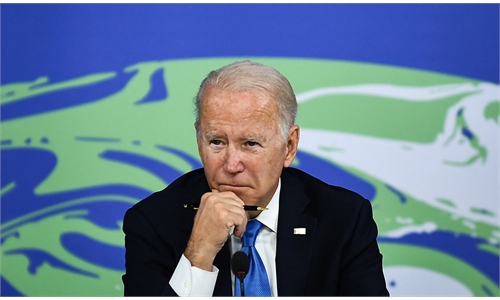Biz Quick Take: UK-Australia infrastructure plan to counter China? More empty talks

Britain's Foreign Secretary Liz Truss and US Secretary of State Antony Blinken attend a G7 Foreign and Development Ministers Session with Guest Countries and ASEAN Nations in Liverpool, north-west England on December 12, 2021. Photo: AFP
The UK Foreign Secretary Liz Truss on Thursday signed a Memorandum of Understanding with Australian Foreign Minister Marise Payne to jointly promote infrastructure investment in Indo-Pacific, according to a statement published by the UK government on Thursday.
The infrastructure deal was signed during Truss' Australia visit this week to participate the "2+2" ministerial meeting between the the UK and Australia in Sydney on Friday, where China was often targeted. Deeper defence ties between the two countries are "vital to counter China's influence," Truss said, according to Australian media outlets.
To support the plan, the UK is stepping up its work on infrastructure investment and aims to mobilize up to £8 billion ($11 billion) of UK-backed financing a year by 2025, said the statement. Truss said that the UK is committed to building a "network of liberty" and that means championing democracy by supporting countries in the Indo-Pacific to resolve their development needs.
The UK is promoting closer cooperation with Australia to provide Indo-pacific countries with investment opportunities for infrastructure to end a strategic reliance on malicious parties in energy, investment and technology, the Radio France Internationale (RFI) reported on Wednesday.
Judging from the rhetoric coming from the UK and Australia sides, their new Indo-Pacific infrastructure plan is clearly based on ideological and geopolitical calculations, just like their previous economic initiatives in the region.
After Indo-Pacific became a geopolitical buzzword in Western countries, as a close ally of the US, the UK instantly embraced the idea to join the US-led clique's initiatives to promote economic and trade cooperation in the region to counter "China's influence."
In early June, the Group of Seven (G7) announced their plan to mobilize hundreds of billions of dollars of infrastructure investment for low- and middle-income countries - the Build Back Better World (B3W) initiative. The initiative, which ranges from Latin America and the Caribbean, to Africa and the Indo-Pacific in geographic terms, was apparently overshoots in funding terms to rival the Belt and Road Initiative (BRI).
However, economically speaking, the G7's "BRI alternative" will not provide enough funds supports to regional countries as it committed, especially as many of Western countries are facing skyrocketing levels of debt and inflation and can barely finance their own domestic infrastructure to boost their own post-Covid economies.
Moreover, this kind of economic and trade cooperation initiative based on geopolitical calculation is seeing signals of inconsistency of among its participants. The European Union (EU) in last December announced its own infrastructure initiative, the so-called Global Gateway, a plan to mobilize up to 300 billion euro ($341 billion) in public and private funds by 2027 to finance EU infrastructure projects abroad, which has also been widely described as a bid to rival BRI.
The new infrastructure initiative by the UK and Australia will almost certainly turn out to be lip service rather than any concreate engagement. It is also difficult to succeed if it does not conform to the trend of globalization and free trade. It is hoped that the UK and Australia can learn the lesson from the consequence of their trade loss due to their anti-China mentality and make overdue adjustments to their trade policies when dealing with Beijing.

